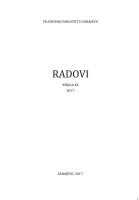RELATIONSHIP BETWEEN HUMOR STYLES AND SUBJECTIVE WELL-BEING
RELATIONSHIP BETWEEN HUMOR STYLES AND SUBJECTIVE WELL-BEING
Author(s): Jadranka Kolenović-Đapo, Nermin Đapo, Nina Hadžiahmetović, Indira FakoSubject(s): Social Sciences, Psychology, Social psychology and group interaction, Behaviorism
Published by: Filozofski fakultet Univerziteta u Sarajevu
Keywords: humor styles; positive and negative affectivity; subjective happiness; life satisfaction;
Summary/Abstract: A common belief is that a greater sense of humor enhances psychological well-being. The empirical evidence for this general facilitative effect of humor is quite equivocal, however, with only some research being supportive. The present study aimed to investigate the relationship between humor styles, positive and negative emotions,subjective happiness and life satisfaction among Sarajevo undergraduate students. A total of 394 undergraduates were asked to complete selfreport measures of four components of sense of humor, as well as several indices of psychological well-being, including positive and negative affectivity, subjective happiness and life satisfaction. As we expected,the adaptive components of sense of humor are positively related with subjective well-being, being associated with greater life satisfaction,subjective happiness and positive mood. In contrast, the maladaptive components of humor are negatively related with subjective well-being,being positively associated with negative affectivity and negatively with life satisfaction and subjective happiness.
Journal: Radovi Filozofskog fakulteta u Sarajevu
- Issue Year: 20/2017
- Issue No: 1
- Page Range: 129-144
- Page Count: 16
- Language: English

